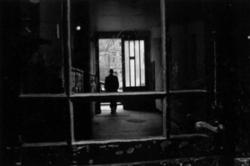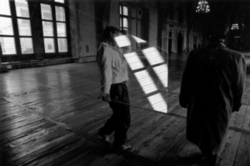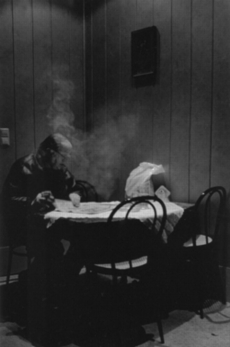|
Maya Arad’s novel in verse, Another Place, A Foreign City appeared in late 2003 and quickly became one of the most successful books of the year, despite it being entirely composed of 355 rhyming sonnets. Like Vikram Seth’s The Golden Gate, another debut novel in verse, Arad’s first novel is a tour-de-force of lyric inventiveness inspired by Alexander Pushkin’s Eugene Onegin. Arad’s novel pays homage to Pushkin’s masterwork, using Onegin stanzas to tell the story of two young lovers, Orit and Jay, against the backdrop of Tel Aviv in the early 1990s. In these eleven stanzas excerpted from Canto II, we meet Jay, an immigrant from Canada who is ambivalent both about his military service and Orit, the love-struck soldier assigned to help him acclimate to Israel. Through Adriana Jacobs’ graceful and witty translation, the serious complexities of Israeli and Jewish identity emerge with a sense of the same playful irony as in Arad’s original. — Adam Rovner, Translations Editor
|
2.11
Every night Orit measures  the sidewalks of Ranak Street The solitary hope in her heart May be fulfilled this evening: Finally, a moment’s calm, when she pictures him heading home as night begins to fall. Were she to receive just one glance! To meet him “by chance”…Meanwhile she sits, for hours, staring into the chill. Is that light along his windowsill? Is it still parked, the automobile? Such stupid, endless concerns— To Dizengoff one best return.
the sidewalks of Ranak Street The solitary hope in her heart May be fulfilled this evening: Finally, a moment’s calm, when she pictures him heading home as night begins to fall. Were she to receive just one glance! To meet him “by chance”…Meanwhile she sits, for hours, staring into the chill. Is that light along his windowsill? Is it still parked, the automobile? Such stupid, endless concerns— To Dizengoff one best return.
2.12
Had she just turned back a ways toward that one neighboring road! As you approach Arlozorov— windowpane of a noisy café. There’s Jay. Beer and cigarette in hand, reflected in the looking glass, skimming The Jerusalem Report and Yedioth for the latest in Sports. Skipping around, at ease, he pauses, his roving eye discerning passers-by, the comings and goings of the patrons, the waitress… Stolen glances, a furtive peek. But had you only seen Orit!
2.13
The waitress promptly comes back to replenish another glass. On the fading mist, he’ll etch Tel Aviv like a reflex. How he wanted it! Tel Aviv! What he sought—he’d finally found. From such joy he almost cried out: Oh, what a land! What a city! Our city is a bona fide town, a real borough, a metropolis. Next to New York, Berlin, Paris, it never falters; it holds its own: Look around. Do you perceive another place like Tel Aviv!
Look around. Do you perceive another place like Tel Aviv!
2.14
The city that never sleeps! The main drag never slows down from morning to evening: It’s lovely to walk along the shore, when the promenade’s deserted, and watch the sun begin to rise, while dipping one’s feet in the surf. No lifeguard, no spectator. And then slip away before the beach bustles with its hordes. Later regaining energy to wander Kerem’s busy streets and to enjoy after one bathes a plate of hummus, ful and egg…
2.17
Faster! Faster! No dawdling! Eat up! Where will we go this time? Who knows! The opera? The cinema? The theater? Or a restaurant? The city’s riches seem endless until it loses consciousness. Faster—draining—every minute— until the hour hand strikes midnight. Sleep? Too bad! We’re still running on full and the night is still young. Let’s go party! Let’s find a club! The night is tender and inviting. December’s here, can you believe? It feels like spring in Tel Aviv!
2.19
His heart thirsts for azure and light. It loathes the darkness and the cold. At least spring nears—for how he dislikes the pools of melting, murky snow. Heavy the burden that he carries. The heart commands: Far away! Go! Another place, a foreign city— But these too he’ll come to abhor. Distracting and burdensome things, The work routine and daily strain: Endless tyrants, inflicting pain. Thoughts that torment relentlessly. Everything’s familiar, lacking zest… And suddenly—to Israel?
2.21
Sam Rifkin and Estella, his wife, doused cold water on their son’s designs: Where did you get an idea like this! All of a sudden, a Zionist. His siblings Jeremiah, Cal and Polly rebuke the youth: Such a folly! But the idea has its charm for Grandpa Leib (father of Sam). “Go for it boy,” urges Leibl. (in ’24 he made aliyah but then went on to Canada) “I say, if only I were able…” Grandson Jay will finish what he began. “Quick! To Israel!” he commands.
All of a sudden, a Zionist. His siblings Jeremiah, Cal and Polly rebuke the youth: Such a folly! But the idea has its charm for Grandpa Leib (father of Sam). “Go for it boy,” urges Leibl. (in ’24 he made aliyah but then went on to Canada) “I say, if only I were able…” Grandson Jay will finish what he began. “Quick! To Israel!” he commands.
2. 23
Though ready to suffer its demands, even the I.D.F. service, of which he had been so nervous, in the end, really wasn’t that bad. His truncated basic training sped by like a bullet. As for the Education Corps— He wakes up late in the morning, skips some days, works out of home, calling the shots, his own boss. All that remains of his boot-camp days is an olive green uniform, an I.D., beret, and kitbag with bandages and his dog tag.
2.24
No longer is the young man bored. Suddenly he wants to know it all. And a crude thought begins to take form. Shall I go back to school this Fall? Meanwhile he’s opening his eyes, taking in everything from all sides, Reading in Hebrew (classic lit— “to improve his skills a bit”), riding around the city on his bike, swimming daily in the sea alone chatting with his neighbors (“Shalom”). He barely has time to write to his worried parents and say that finally he’s doing O.K.!
2.26
Time crawls!—a well known fact— It’s just nine o’clock, still early, so can anyone explain why the café is already empty? A pack of gabbing women make straight for whipped mounds of cream cake. Esteemed matrons, long over the hill, with abandon eating their fill. Between mouthfuls and idle talk out comes a deck of cards… No doubt about it—life’s a ball! That lousy hour before nightfall, abandoned coffee, cards—with dismay he rises and signals to pay.
It’s just nine o’clock, still early, so can anyone explain why the café is already empty? A pack of gabbing women make straight for whipped mounds of cream cake. Esteemed matrons, long over the hill, with abandon eating their fill. Between mouthfuls and idle talk out comes a deck of cards… No doubt about it—life’s a ball! That lousy hour before nightfall, abandoned coffee, cards—with dismay he rises and signals to pay.
2.27
His hand goes back into his pocket, and he wonders: Did I miscount it? Meanwhile Orit draws out the key to the house on Arnon Street, wordlessly going inside. “Orit?” The questions arrive. “Yes, mother.” “Did you eat already?” “Yes. No. Doesn’t matter.” “Is everything all right?” “Yes.” One more try: “Someone called earlier today.” “Who?” “A boy. With a slight accent. American—” Instantly a deep blush creeps across her face. “Orit! What’s with the rush? Hey!”— But she’s already calling Jay.
|
Zeek‘s Hebrew translations are made possible by a grant from the Council of Literary Magazines and Presses, supported by public funds from the New York State Council on the Arts, a state agency. Please direct submissions and queries to editors[at]zeek.net.
|








I must admit that that is one amazing insight. It surely gives a company the opportunity to get in on the ground floor and also really take part in creating something special and tailored to their needs.